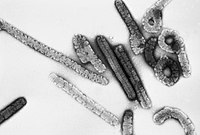
Photo from wikipedia
Background Fanconi–Bickel syndrome is an autosomal recessive disorder of glucose metabolism. It is an extremely rare disorder. Most cases have been reported in consanguineous communities. None of the cases have… Click to show full abstract
Background Fanconi–Bickel syndrome is an autosomal recessive disorder of glucose metabolism. It is an extremely rare disorder. Most cases have been reported in consanguineous communities. None of the cases have been reported in Black Africans in sub-Saharan Africa. This case was diagnosed 3 years after initial presentation due to diagnostic challenges and limited awareness of similar metabolic syndromes in our setting. Case presentation We report the case of a 4-year-old boy, born to non-consanguineous Black African parents, who presented with failure to thrive and rachitic features in infancy. Clinical, laboratory, and radiological features were indicative of Fanconi–Bickel syndrome. No genetic testing was done. The diagnosis was made 3 years after the initial presentation due to diagnostic challenges. He showed clinical improvement with the institution of a galactose-free diet. Conclusion Fanconi–Bickel syndrome occurs even in non-consanguineous Black African populations. Therefore, clinicians in resource-poor settings should raise their index of suspicion for such metabolic disorders in settings with a high prevalence of failure to thrive among children.
Journal Title: Journal of Medical Case Reports
Year Published: 2020
Link to full text (if available)
Share on Social Media: Sign Up to like & get
recommendations!